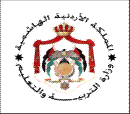 |
|
|
|
General Information |
|
|
Services |
|
|
Organizational Chart |
|
|
Tenders |
|
|
FAQ |
|
|
Contact Information |
| |
All Ministries/Entities |
| Ministry of Education |
| General Information |
| Introduction |
Since the First National Conference for Educational Development convened in 1987, the Jordanian educational system has achieved material achievements in terms of quality and quantity, evident in the development of the educational policy, modernization of the educational infrastructure, increase in the average number of students joining the educational system, increase in the number of students, teachers and schools in all school levels, emphasis placed on the importance of free compulsory education and increasing its duration from nine to ten years, as well as the diversification of vocational training education and its areas of specialization in order to contribute to fulfilling the needs of the labor market of skilled labor. In addition there has been comprehensive development in curriculum and textbooks, achieving outstanding progress in developing school buildings, facilities, educational premises and educational technologies, and developing supervisory, educational, administrative and technical frameworks, in training and rehabilitation terms. In order to deepen the qualitative impact of the educational development process, increase the level of education and improve its quality, Jordan has emphasized the need to be in-line with scientific, educational and technical new developments, and to be aware of developmental, regional and international models and experiences that can be benefited from when introducing educational modernization in the educational system and its various activities. Realizing the major role that education plays in enhancing human development, and believing in the necessity of achieving a balance between the quantity dictated and the quality desired in the educational system, concentration has focused on modernizing curriculum and textbooks, and to include in them modern concepts in areas such as population, environmental, health, and traffic education, and to dedicate concepts such as democracy and human rights, and to emphasize national, patriotic and human dimensions, and to enhance student scientific research skills. In line with international trends, a comprehensive evaluation process was implemented of the efforts exerted by all official, national and voluntary societal establishments, concerning the “education for all” program, and its fields and activities. A national report was prepared in light of the evaluation results, and was presented in a national symposium in which all concerned parties took part, surveying the most important future policies and aspirations in the area of “education for all”. The Broad Objectives of the Education and Training Sector The general common objectives that the education, higher education, and vocational training sectors aspire to achieve as an integrated system during the implementation stage of the five-year plan for the education and training sector in the Kingdom (1999-2003), may be highlighted as follows: 1. Raising the efficiency of the education and training systems and increase their efficiency, taking into consideration the economies of these systems in their inputs, operations and outputs. 2. Developing the infrastructures of the educational and training establishments. 3. Developing the qualitative sides of the educational and vocational training systems, and aspire to achieving excellence in their programs and their diversity, resulting in graduating qualified human resources capable of competing in the local and Arab labor market, and of accommodating the globalization and information age. 4. Reacting with the development of international culture, getting exposed to international experiences, and accommodating technical and scientific development in the various areas of education and training. 5. Increasing compatibility and develop links and channels between the educational and training systems outputs, and the requirements of economic and social development. 6. Enhancing democracy and equal opportunity between regions in the educational system and achieve equilibrium between individual requirements and needs from one side, and societal and developmental requirements from the other. 7. Building partnership relationships between educational and training establishments and societal sectors and providing support for joint projects between them in areas such as exchange of expertise, consultation, services, research, training and educational facilitation. 8. Developing and expanding the private sector’s national role, increasing its efficiency in the areas of planning, implementation and funding as related to human development, encouraging it to invest in educational and training sectors, and strive for enhancing the role of 9. Increasing and diversifying funding sources and developing the contribution of the national sector in them. 10. Achieving vocational growth for those working in the educational and training institutions, and working at linking promotion to vocational growth. 11. Developing administrative, financial and technical aspects of the educational and training institutions and deepening the role of decentralization in work. 12. Updating legislation governing the performance of educational and training institutions in line with developments. 13. Broadening the opportunities for female education and vocational training, especially in areas where she already practices work, activating the role of the educational system in enhancing the position of the woman in the family and society, and activating her role in economic and social development. |
| Top
|